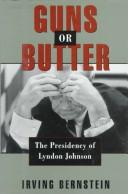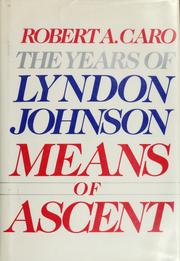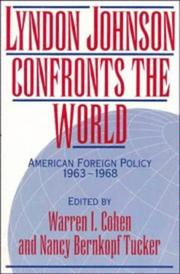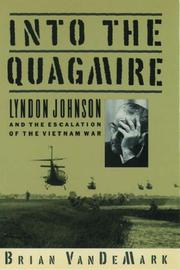| Listing 1 - 10 of 30 | << page >> |
Sort by
|

ISBN: 0195063120 9786613121370 019987431X 1283121379 9780199874316 9780195063127 9781283121378 6613121371 Year: 1996 Publisher: New York : Oxford University Press,
Abstract | Keywords | Export | Availability | Bookmark
 Loading...
Loading...Choose an application
- Reference Manager
- EndNote
- RefWorks (Direct export to RefWorks)
The presidency of Lyndon Johnson was a pivotal moment in twentieth-century American history. From the decisive social programs of the Great Society, to the triumph of the Civil and Voting Rights Acts, to the catastrophe of the Vietnam War and domestic unrest, it was an era of dramatic accomplishment and wrenching tragedy. In Guns or Butter, renowned historian Irving Bernstein brings those five climactic years of the sixties vividly to life, from the moment Lee Harvey Oswald aimed a rifle from the window of the Texas School Depository to the tense ballot-counting that put Richard Nixon in the W
United States --- Politics and government --- 1963-1969 --- Presidents --- Biography --- Johnson, Lyndon B. --- Chan-sên, --- Johnson, Lyndon Baines, --- Dzhonson, Lindon, --- L. B. J. --- ג'ונסון, לינדון --- ジョンソン, --- Johnson, L. --- Čhō̜nsan, Lindō̜n Bī.,
Book
ISBN: 9781626186934 1626186936 9781626186248 1626186243 Year: 2013 Publisher: New York Nova Publishers
Abstract | Keywords | Export | Availability | Bookmark
 Loading...
Loading...Choose an application
- Reference Manager
- EndNote
- RefWorks (Direct export to RefWorks)
Presidents --- Johnson, Lyndon B. --- Chan-sên, --- Johnson, Lyndon Baines, --- Dzhonson, Lindon, --- L. B. J. --- ג'ונסון, לינדון --- ジョンソン, --- Johnson, L. --- Čhō̜nsan, Lindō̜n Bī., --- United States --- Politics and government
Book
ISBN: 9780300182422 0300182422 9780300180503 0300180500 Year: 2015 Publisher: New Haven
Abstract | Keywords | Export | Availability | Bookmark
 Loading...
Loading...Choose an application
- Reference Manager
- EndNote
- RefWorks (Direct export to RefWorks)
A firsthand observer weighs the achievements-and failures-of two fabled American presidents As a young White House correspondent during the Kennedy and Johnson years in Washington, D.C., Godfrey Hodgson had a ringside seat covering the last two great presidents of the United States, John F. Kennedy and Lyndon B. Johnson, two men who could not have been more different. Kennedy's wit and dashing style, his renown as a national war hero, and his Ivy League Boston Brahmin background stood in sharp contrast to Lyndon Johnson's rural, humble origins in Texas, his blunt, forceful (but effective) political style, his lackluster career in the navy, and his grassroots populist instincts. Hodgson, a sharp-eyed witness throughout the tenure of these two great men, now offers us a new perspective enriched by his reflections since that time a half-century ago. He offers us a fresh, dispassionate contrast of these two great men by stripping away the myths to assess their achievements, ultimately asking whether Johnson has been misjudged. He suggests that LBJ be given his due by history, arguing that he was as great a president as, perhaps even greater than, JFK. The seed that grew into this book was the author's early perception that JFK's performance in office was largely overrated while LBJ's was consistently underrated. Hodgson asks key questions: If Kennedy had lived, would he have matched Johnson's ambitious Great Society achievements? Would he have avoided Johnson's disastrous commitment in Vietnam? Would Nixon have been elected his successor, and if not, how would American politics and parties look today? Hodgson combines lively anecdotes with sober analyses to arrive at new conclusions about the U.S. presidency and two of the most charismatic figures ever to govern from the Oval Office.
Presidents --- Kennedy, John F. --- Johnson, Lyndon B. --- Chan-sên, --- Johnson, Lyndon Baines, --- Dzhonson, Lindon, --- L. B. J. --- ג'ונסון, לינדון --- ジョンソン, --- Johnson, L. --- Čhō̜nsan, Lindō̜n Bī., --- Kennedy, John Fitzgerald --- United States --- Politics and government
Book
ISBN: 1108140572 1108140378 110814120X 1107193036 1316643476 9781108141208 9781108140379 9781107193031 9781316643471 Year: 2018 Publisher: Cambridge, United Kingdom New York, NY, USA
Abstract | Keywords | Export | Availability | Bookmark
 Loading...
Loading...Choose an application
- Reference Manager
- EndNote
- RefWorks (Direct export to RefWorks)
1968 was an unprecedented year in terms of upheaval on numerous scales: political, military, economic, social, cultural. In the United States, perhaps no one was more undone by the events of 1968 than President Lyndon Baines Johnson. Kyle Longley leads his readers on a behind-the-scenes tour of what Johnson characterized as the 'year of a continuous nightmare'. Longley explores how LBJ perceived the most significant events of 1968, including the Vietnam War, the assassinations of Martin Luther King, Jr and Robert Kennedy, and the violent Democratic National Convention in Chicago. His responses to the crises were sometimes effective but often tragic, and LBJ's refusal to seek re-election underscores his recognition of the challenges facing the country in 1968. As much a biography of a single year as it is of LBJ, LBJ's 1968 vividly captures the tumult that dominated the headlines on a local and global level.
Presidents --- Election --- Johnson, Lyndon B. --- Chan-sên, --- Johnson, Lyndon Baines, --- Dzhonson, Lindon, --- L. B. J. --- ג'ונסון, לינדון --- ジョンソン, --- Johnson, L. --- Čhō̜nsan, Lindō̜n Bī., --- United States --- Politics and government

ISBN: 0394528352 Year: 1990 Volume: *2 Publisher: New York (N.Y.): Knopf
Abstract | Keywords | Export | Availability | Bookmark
 Loading...
Loading...Choose an application
- Reference Manager
- EndNote
- RefWorks (Direct export to RefWorks)
Elections --- Presidents --- Electoral politics --- Franchise --- Polls --- Political science --- Politics, Practical --- Plebiscite --- Political campaigns --- Representative government and representation --- History --- Biography --- Johnson, Lyndon B. --- Johnson, Lyndon Baines, --- Chan-sên, --- Dzhonson, Lindon, --- L. B. J. --- ג'ונסון, לינדון --- ジョンソン, --- Johnson, L. --- Čhō̜nsan, Lindō̜n Bī., --- United States. --- Mei-kuo tsʻan i yüan --- Elections, 1948. --- Texas --- Politics and government --- United States

ISBN: 0521424798 0521414288 113917391X 9780521414289 9780521424790 Year: 1994 Publisher: Cambridge : Cambridge University Press,
Abstract | Keywords | Export | Availability | Bookmark
 Loading...
Loading...Choose an application
- Reference Manager
- EndNote
- RefWorks (Direct export to RefWorks)
This is the most comprehensive, perceptive, and nuanced review to date of the foreign policy of the Lyndon Johnson era. It demonstrates US concern not just with the Soviet Union, Europe, and nuclear weapons issues, but the overwhelming preoccupation with Vietnam which shaped policy throughout the world. During this period, Johnson also faced a series of emergencies ranging from turmoil in the Congo, to war in the Middle East, to a perceived communist challenge in the Caribbean, to a lingering hostage crisis in Asia. Using the most recently declassified documents, it explains in thoroughly readable prose the intricacies of the foreign policy dilemmas that forced Johnson's Great Society domestic agenda into retreat.
Johnson, Lyndon Baines, --- United States --- Foreign relations --- Arts and Humanities --- History --- Johnson, Lyndon B. --- Chan-sên, --- Dzhonson, Lindon, --- L. B. J. --- ג'ונסון, לינדון --- ジョンソン, --- Johnson, L. --- Čhō̜nsan, Lindō̜n Bī., --- Johnson, Lyndon Baines, - 1908-1973 --- United States - Foreign relations - 1963-1969
Book
ISBN: 0826218199 0826266479 9780826266477 9780826218193 Year: 2008 Publisher: Columbia University of Missouri Press
Abstract | Keywords | Export | Availability | Bookmark
 Loading...
Loading...Choose an application
- Reference Manager
- EndNote
- RefWorks (Direct export to RefWorks)
"Uses recently declassified sources to trace the successes and limitations of the Johnson administration's efforts to use food aid as a diplomatic tool during the Cold War, both to gain support for U.S. policies and to reward or punish allies such as Israel, India, and South Vietnam"--Provided by publisher.
Food relief, American --- Food supply --- Political aspects. --- Political aspects --- Johnson, Lyndon B. --- United States --- Developing countries --- Foreign relations --- Food control --- American food relief --- Johnson, Lyndon Baines, --- Chan-sên, --- Dzhonson, Lindon, --- L. B. J. --- ג'ונסון, לינדון --- ジョンソン, --- Johnson, L. --- Čhō̜nsan, Lindō̜n Bī., --- Produce trade --- Agriculture --- Food security --- Single cell proteins

ISBN: 0195096509 9780195096507 1423740572 9781423740575 1280451203 9781280451201 0195357191 9780195357196 0198022980 1602560412 0199880042 Year: 1995 Publisher: New York ; Oxford : Oxford University Press,
Abstract | Keywords | Export | Availability | Bookmark
 Loading...
Loading...Choose an application
- Reference Manager
- EndNote
- RefWorks (Direct export to RefWorks)
In November of 1964, as Lyndon Johnson celebrated his landslide victory over Barry Goldwater, the government of South Vietnam lay in a shambles. Ambassador Maxwell Taylor described it as a country beset by ""chronic factionalism, civilian-military suspicion and distrust, absence of national spirit and motivation, lack of cohesion in the social structure, lack of experience in the conduct of government."" Virtually no one in the Johnson Administration believed that Saigon could defeat the communist insurgency--and yet by July of 1965, a mere nine months later, they would lock the United States
Vietnam War, 1961-1975 --- United States --- Politics and government --- 1963-1969 --- Vietnam Conflict, 1961-1975 --- Vietnamese Conflict, 1961-1975 --- Vietnamese War, 1961-1975 --- Causes. --- Johnson, Lyndon B. --- Chan-sên, --- Johnson, Lyndon Baines, --- Dzhonson, Lindon, --- L. B. J. --- ג'ונסון, לינדון --- ジョンソン, --- Johnson, L. --- Čhō̜nsan, Lindō̜n Bī.,
Book
ISBN: 1283121425 9786613121424 0199874417 9780199874415 0195082672 9780195082678 0195046412 9780195046410 Year: 1991 Publisher: New York : Oxford University Press,
Abstract | Keywords | Export | Availability | Bookmark
 Loading...
Loading...Choose an application
- Reference Manager
- EndNote
- RefWorks (Direct export to RefWorks)
A counter-revisionist examination of JFK and his administration, Promises Kept presents a policy history of major domestic legislative efforts between 1961 and 1963. Bernstein focuses on administraive and congressional progress under Kennedy in civil rights, education, taxes, unemployment, Medicare, and the Peace Corps. He persuasively argues that Kennedy was indeed a successful president, showing that many of JFK's campaign promises were well on their way to enactment by the time of his assassination, even after two years of dealings with a balky and often hostile Congress, and the difficulty
Kennedy, John F. --- Johnson, Lyndon B. --- Chan-sên, --- Johnson, Lyndon Baines, --- Dzhonson, Lindon, --- L. B. J. --- ג'ונסון, לינדון --- ジョンソン, --- Johnson, L. --- Čhō̜nsan, Lindō̜n Bī., --- Kennedy, John Fitzgerald --- United States --- Politics and government --- Economic policy --- Social policy. --- 1961-1963 --- 1963-1969 --- 1961-1971 --- Social policy
Book
ISBN: 178170080X 1847791492 9781847791498 9780719077784 0719077788 0719096693 1847797202 Year: 2008 Publisher: Manchester New York Manchester University Press
Abstract | Keywords | Export | Availability | Bookmark
 Loading...
Loading...Choose an application
- Reference Manager
- EndNote
- RefWorks (Direct export to RefWorks)
This is the first comprehensive study of U.S. policy toward China during the presidency of Lyndon Johnson, a critical phase of the Cold War immediately preceding the dramatic Sino-American rapprochement of the early 1970's. Based on a wide array of recently declassified government documents, this study challenges the popular view that Johnson's approach to China was marked by stagnation and sterility, exploring the administration's relationship to both the Vietnam War and the Cultural Revolution. By documenting Johnson's contributions to the decision-making process Lumbers offers a new perspective...
Johnson, Lyndon B. --- United States --- China --- Politics and government --- Foreign relations --- Chan-sên, --- Johnson, Lyndon Baines, --- Dzhonson, Lindon, --- L. B. J. --- ג'ונסון, לינדון --- ジョンソン, --- Johnson, L. --- Čhō̜nsan, Lindō̜n Bī., --- China. --- Cold War. --- Cultural Revolution. --- Lyndon Johnson. --- Sino-American rapprochement. --- US policy. --- Vietnam War. --- declassified government documents. --- early 1970s. --- foreign-policy leader.
| Listing 1 - 10 of 30 | << page >> |
Sort by
|

 Search
Search Feedback
Feedback About UniCat
About UniCat  Help
Help News
News